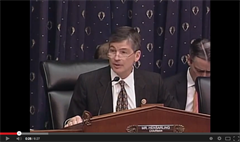 |
| CLICK HERE TO WATCH |
When this Committee first embarked on the Federal Reserve Centennial Oversight Project last year, we promised a thorough review of America’s central bank. Today’s hearing is this Committee’s 11th hearing on the Federal Reserve in the 113th Congress. Certainly our understanding of the Federal Reserve has been enriched through discussion and debate among our colleagues and complimented by the knowledge and perspective of many distinguished witnesses and scholars, including those who are here today.
As the hearing schedule for the 113th Congress begins to wind down, I do wish to thank all of our colleagues and witnesses for their contributions to this project and the risks they undertook to provide such. I say “risk” because I’m reminded that Senator Nelson Aldrich, one of the legislators behind the Federal Reserve Act, noted that “the study of monetary questions is one of the great causes of insanity.” Hopefully, we can avoid that fate. Regardless, we do expect to issue a full report on our findings from the Centennial Oversight Project in the fall.
Today we consider the first piece of legislation to arise from this process; legislation to begin to reinvigorate the Federal Reserve with the type of accountability to the Congress and the people that the founders expected of all federal agencies when they drafted the Constitution. I, again, say the first piece of legislation because reforming an institution as old, entrenched, important and powerful as the Federal Reserve will be a work in progress. But it is work we must not ignore. There are many excellent, capable public servants at the Fed who have served our nation well and are currently serving our nation well.
But I believe a critical examination of the last 100 years of the Fed’s actions reveals a mixed bag at best. And most recently, we have seen a radical departure from the historic norms of monetary policy conduct. From an unprecedented use of 13(3) exigent powers to select intervention in distinct credit markets, to the facilitation of our unsustainable national debt, to a blurring of the lines between fiscal and monetary policy -- all of which presents large and unwarranted risk to our economy.
Clearly our work must be thoughtful, it must be careful and it must be deliberate, but much is at stake so we cannot ignore it. Thus, I fully expect the legislative effort to continue in this Congress and the next.
A reoccurring theme throughout our hearings has been that monetary policy is at its best in maintaining stable, healthy economic growth when it follows a clear predictable rule or path free from political micro-management, as it did during the Great Moderation of 1987-2002.
Earlier in her career, Chair Yellen said at an FOMC meeting that following one type of rule, specifically the Taylor rule, is “what sensible central banks do” – and I agree.
Let me make one thing clear at the outset. We do not suggest for a moment that Congress, much less the White House or Treasury, should conduct monetary policy operations. We continue to respect the Federal Reserve’s independence in monetary policy. But that independence and discretion must be paired with appropriate transparency and accountability. What we require today in this legislation is that the Fed use a clear map of its own choosing to set the course for monetary policy and share that map with the rest of us.
Additionally, the case for Federal Reserve independence when it sets monetary policy does not hold up when we consider the Fed’s new powers under Dodd-Frank to regulate an ever-increasing share of the American economy. The Fed should not be permitted to hide its prudential regulatory actions behind its monetary policy independence cloak.
So today we consider a statutory requirement, among others, that the Federal Reserve conduct cost-benefit analysis as it adopts new regulations. Even President Obama has issued two Executive Orders reaffirming the importance of thorough cost-benefit analysis by both executive and independent regulatory agencies. Today’s legislation includes a number of other additional transparency and accountability provisions which are badly needed for the Federal Reserve. It is clearly time to hold the Fed to the same openness and transparency that we demand of other federal agencies.
In closing, two final points. I want to thank Chairman Campbell and his committee for all the great work they have done and will continue to do on the Federal Reserve Centennial Oversight Project. I want to thank Chairman Garrett, whose ideas have formed the bulk of the bill that will be before us today. And I want to thank Vice-Chairman Huizenga for his work on carrying this bill as well.
Secondly, I want to emphasize again that I expect further pieces of legislation to follow. For example, we continue to examine the Fed’s 13(3) powers as modified by Dodd-Frank. Also, many in the public have inquired about H.R. 24, the Audit the Fed bill. Counterintuitively, that bill falls under the jurisdiction of the House Oversight Committee, not our own, and we look forward to Chairman Issa bringing that bill to the floor. And I would note that today’s bill contains a provision requiring the GAO to ensure that the Fed complies with our statute by auditing the monetary rule they submit to the Congress, and thus compliments the Audit the Fed bill.
Again, our goal today is to begin the process of developing legislation that will ultimately strengthen the Federal Reserve in fulfilling its mission to maintain stable prices and job growth and ensure that the Fed’s rulemaking process is transparent and predictable. I appreciate our panel today for coming to the hearing.
###